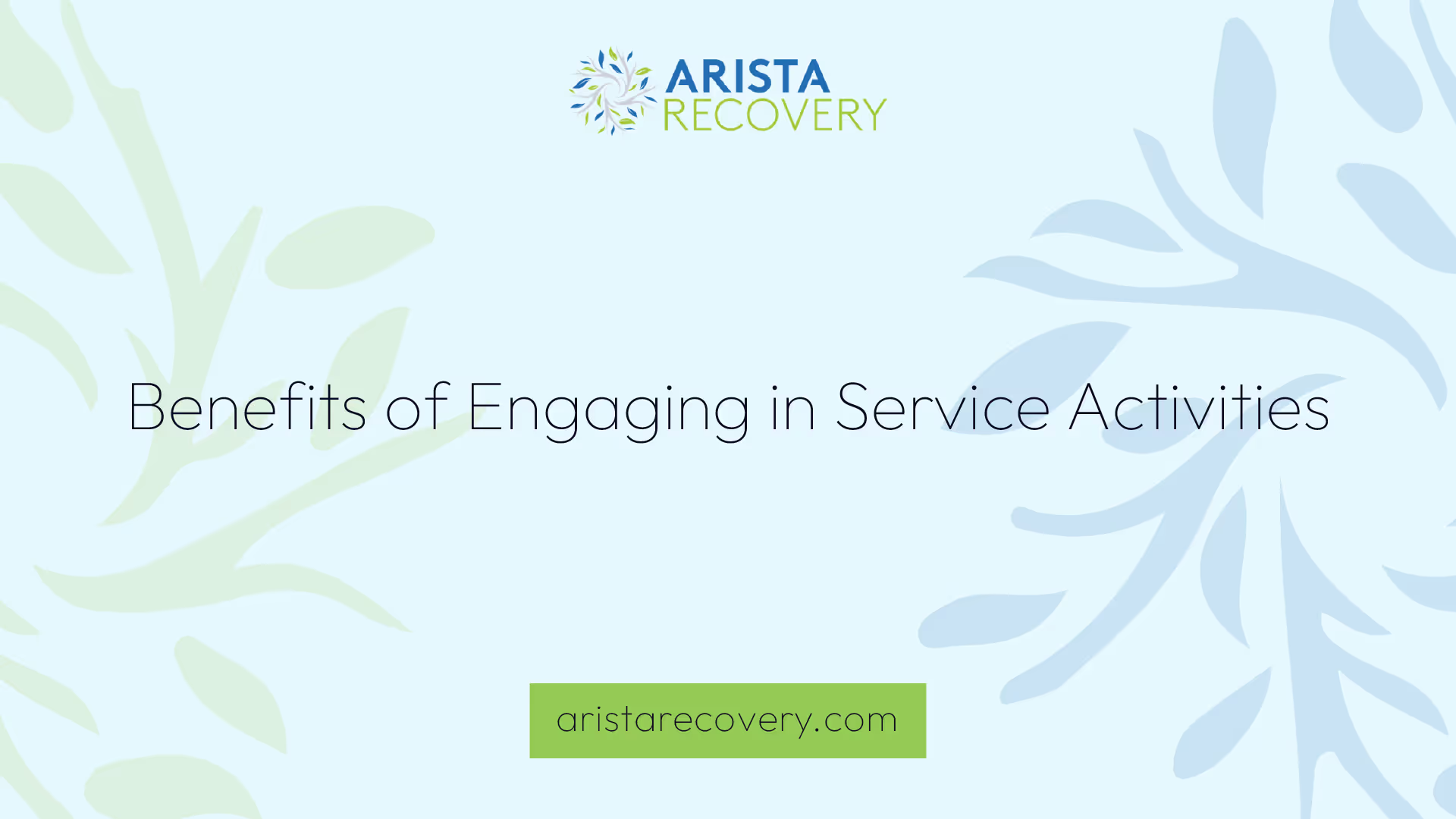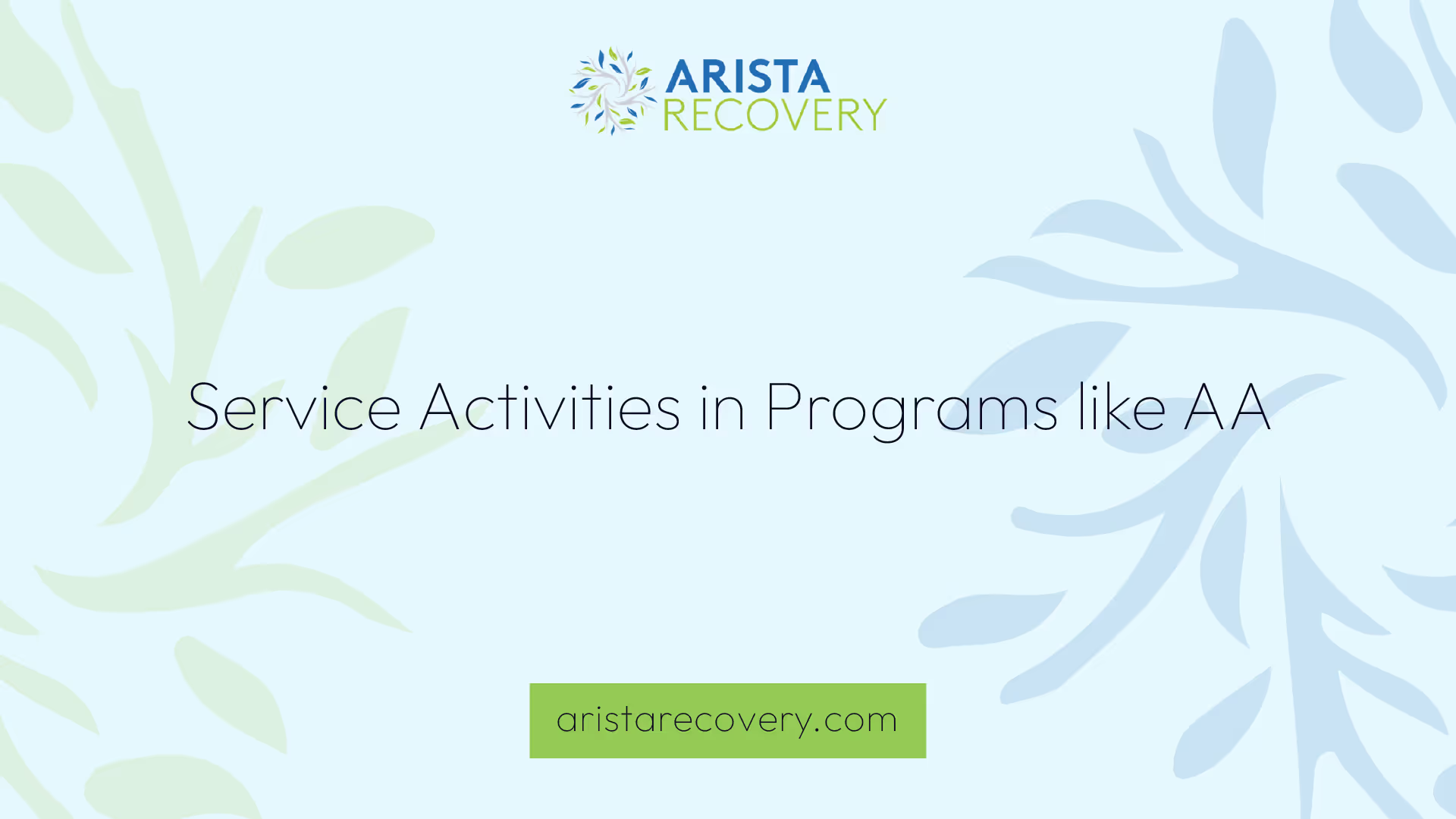
Service Keeps You Sober

Importance of Service in Recovery
Service plays a crucial role in the recovery process, offering numerous benefits that enhance sobriety rates and positively impact mental health.
Enhancing Sobriety Rates
Engaging in service activities significantly boosts the chances of maintaining sobriety. Research conducted by Maria Pagano at Case Western University revealed that addicts who help others, even in small ways, are more likely to stay sober. Specifically, 40% of helpers were able to avoid drinking in the 12 months following treatment, compared to only 22% of non-helpers [1].
Active participation in service activities, especially within programs like Alcoholics Anonymous (AA), fosters personal accountability and strengthens sobriety. In a study with 1,726 participants, 40% of helpers avoided taking a drink in the 12 months following the 3-month treatment period, while only 22% of non-helpers stayed sober—a doubling effect rarely seen in social science research.
These findings highlight the therapeutic impact of service activities in maintaining sobriety. Programs like AA emphasize the importance of service, such as becoming sponsors or completing the 12th step, which involves helping others in their recovery journey.
Impact on Mental Health
The mental health benefits of engaging in service activities are profound. Service not only enhances self-esteem and reduces feelings of isolation but also provides a sense of purpose and belonging. This is particularly important for individuals in recovery, as it helps to build a positive self-image and strengthens their commitment to sobriety.
Service activities create opportunities for individuals to connect with others who are facing similar challenges. This sense of community and mutual support can be incredibly therapeutic, reducing the risk of relapse and promoting long-term recovery. Residents in recovery homes (RHs) who engage in structured service activities for at least six months tend to have better long-term outcomes, including lower relapse rates and improved sobriety.
For more insights into the benefits of service in recovery, check out our articles on the promises of recovery and gratitude in recovery.
Service keeps you sober by providing a structured routine, enhancing self-esteem, and fostering a sense of community. These elements are essential for individuals seeking addiction treatment and support in their recovery journey.

Benefits of Engaging in Service Activities
Engaging in service activities can significantly enhance the recovery process for individuals overcoming addiction. This section will explore how participating in service can reduce substance cravings and improve overall functioning.
Reduction in Substance Cravings
Service activities have been shown to contribute to a reduction in substance cravings. According to the New Horizons Centers of Excellence, adolescents with higher scores on the Service to Others in Sobriety (SOS) scale, which measures helping behaviors, exhibit significantly lower cravings for alcohol and narcotics. This reduction is critical for sustaining long-term sobriety and minimizing the risk of relapse.
Engaging in service activities helps individuals shift their focus from their cravings to more positive and productive endeavors. This shift can be instrumental in breaking the cycle of addiction and fostering a healthier mindset.
Improved Overall Functioning
Engaging in service activities also leads to improved overall functioning. When individuals participate in service, they often experience reduced feelings of entitlement and increased "global functioning" [1]. This improvement is vital for maintaining stability and achieving long-term success in recovery.
Service activities provide a structured routine and a sense of purpose, replacing the void left by substance use. This structure helps individuals maintain focus and avoid old patterns, contributing to overall mental and emotional well-being.
Community service also allows individuals to gain a sense of accomplishment and develop meaningful relationships with mentors or fellow volunteers [5]. These relationships can be a source of positive reinforcement, motivating individuals to continue their recovery journey and restore self-esteem and trust lost during addiction.
For more information on how service activities can enhance recovery, visit our articles on the promises of recovery and gratitude in recovery.

Service Activities in Programs like AA
Service activities play a crucial role in the recovery journey of individuals in programs such as Alcoholics Anonymous (AA). These activities not only provide a sense of purpose but also contribute significantly to maintaining sobriety.
Higher Sobriety Rates
Engaging in service activities has been shown to significantly enhance sobriety rates among individuals in recovery programs. According to New Horizons Centers of Excellence, addicts who participate in service activities are 40% more likely to avoid drinking in the 12 months following their treatment compared to those who do not engage in such activities. This statistic underscores the powerful impact that service can have on sustaining sobriety.
In a study involving 1,726 participants, it was found that 40% of helpers in AA avoided taking a drink in the 12 months following a 3-month treatment period, while only 22% of non-helpers remained sober. This doubling effect highlights the therapeutic benefits of service activities in maintaining sobriety.
Figures courtesy Robin Recovery
Personal Accountability
Service activities foster a sense of personal accountability among individuals in recovery programs. By taking on roles such as becoming sponsors or completing the 12th step of AA, addicts are encouraged to take responsibility for their actions and support others in their recovery journey. This not only helps them stay committed to their own sobriety but also provides a sense of fulfillment and purpose.
Research from Legends Recovery indicates that addicts who engage in service activities have better outcomes in terms of sobriety. Regardless of factors such as age, gender, income, or severity of addiction, those who help others tend to experience more successful recovery outcomes.
Participation in service activities within 12-step mutual-help organizations like AA and NA has been consistently linked to positive substance outcomes, including prolonged abstinence. By fostering personal accountability, these activities play a vital role in the recovery process.
For more insights into the promises of recovery, check out our article on the promises of recovery. Additionally, exploring the concept of gratitude in recovery can further enhance one's journey toward sobriety.
Psychological and Emotional Benefits of Service
Enhanced Self-Esteem
Engaging in service activities has been shown to enhance self-esteem, reduce feelings of isolation, and foster connections within the community, leading to personal growth and a renewed sense of purpose. Research indicates that helping others can decrease stress, strengthen immune systems, inhibit selfish behaviors, and provide a sense of meaning and a stronger social identity, ultimately enhancing self-esteem.
For more on how service activities can transform your recovery journey, check out the promises of recovery.
Reduction in Isolation
Engaging in community service activities allows individuals to socialize, make meaningful connections, and receive social support. This can prevent relapse triggered by loneliness and isolation. It provides intellectual stimulation and meaningful relationships within the community.
Participating in community service during recovery can also help individuals to socialize with others, make meaningful connections, and receive social support. These activities provide intellectual stimulation and meaningful relationships within the community. Discover more about the benefits of gratitude and social connections in recovery by visiting our page on gratitude in recovery.
Structured Routine and Purpose
Establishing a structured routine and a sense of purpose is essential for individuals in recovery. Engaging in service activities can provide the stability and distraction needed to maintain sobriety, replacing the void left by substance use.
Avoiding Relapse Triggers
A structured routine that includes service work offers a constructive outlet for time and effort, helping individuals avoid idleness, which can lead to relapse. By participating in service activities, individuals in recovery can prevent themselves from falling into old patterns or seeking solace in unhealthy behaviors [3].
According to Surfside Recovery Services, community service also helps manage mental health issues associated with addiction, contributing to healthier sobriety. Additionally, residing in recovery homes (RHs) for at least six months often results in lower relapse rates and improved long-term outcomes [4].
Sense of Accomplishment
Engaging in service activities not only keeps individuals busy but also provides a sense of accomplishment. This fulfillment strengthens their commitment to sobriety. By actively participating in these activities, individuals can find purpose and feel a sense of achievement, which is crucial for maintaining a sober lifestyle.
Recovery coaches (RCs), who are trained peers, play a significant role in this context. RCs provide support and improve treatment retention, relationships with providers, and overall treatment satisfaction, further reducing relapse rates [4].
For more insights into the benefits of service in recovery, read our articles on the promises of recovery and gratitude in recovery.
Support Groups in Recovery
Sustaining Abstinence
Support groups play a crucial role in helping individuals sustain abstinence and recover from substance abuse. These groups provide emotional sustenance, a safe environment, and peer feedback, which are essential components in the recovery journey.
Interpersonal Process Group Psychotherapy (IPGP) links abstinence-based treatment with psychological principles. This model focuses on here-and-now interactions among group members, helping individuals identify and change dysfunctional relationship patterns. This reduces the power and appeal of substances.
Cognitive-behavioral groups are particularly effective in early recovery. They change learned behavior by modifying thinking patterns, beliefs, and perceptions. These groups aim to develop social networks that support abstinence and help individuals manage feelings and behaviors associated with substance use.
Continuing care is an important component of effective treatment, especially for individuals with greater problem severity. Research supports the efficacy of continuing care for both adolescents and adults. Longer durations and active efforts to keep patients engaged show more consistently positive results.
Recovery management checkups (RMC) have shown better substance use outcomes and quicker reentry into treatment during relapses. RMC is also considered a cost-effective and potentially cost-saving intervention.
Developing Interpersonal Skills
Support groups also play a significant role in developing interpersonal skills. Interpersonal process group therapy uses psychodynamics to promote change and healing. It examines fundamental developmental issues, patterns contributing to addiction, and dysfunctional relationship patterns. The group becomes a microcosm of how members relate to people in their daily lives [7].
Cognitive-behavioral groups focus on changing learned behaviors by modifying thinking patterns, beliefs, and perceptions. These groups aim to develop coping skills to achieve and maintain abstinence, manage emotions, solve problems, and monitor feelings and behaviors associated with substance use.
Recovery coaches (RCs) are trained peers who provide supportive services to individuals struggling with substance use disorders. Studies have shown that RCs can improve treatment retention, relationships with providers, overall treatment satisfaction, and reduce rates of relapse [4].
Recovery community centers (RCCs) offer various services such as recovery coaching, employment opportunities, and educational linkages to individuals in recovery. These centers have been associated with increased recovery capital, social support, and improvements in psychological distress, self-esteem, and quality of life [4].
For more information on the psychological and emotional advantages of service in recovery, visit our article on the promises of recovery. Additionally, learn about the importance of gratitude in recovery and how it can further support your journey to sobriety.
References
[1]: https://www.newhorizonscentersoh.org/blog/service-keeps-you-sober
[2]: https://www.robinrecovery.com/post/service-keeps-you-sober
[3]: https://www.legendsrecovery.com/blog/service-keeps-you-sober
[4]: https://www.ncbi.nlm.nih.gov/pmc/articles/PMC7996242/
[5]: https://surfsiderecoveryservices.com/community-service-essential-in-recovery/
[6]: https://www.recoveryanswers.org/resource/peer-based-recovery-support/
When mental health challenges and addiction intersect, it can feel isolating. At Arista, we offer compassionate, evidence-based, and trauma-informed care to help you heal, grow, and move forward.
You’re not alone in this.
When mental health challenges and addiction intersect, it can feel isolating. At Arista, we offer compassionate, evidence-based, and trauma-informed care to help you heal, grow, and move forward.
Support that moves with you.
You’ve taken a brave first step. At Arista Recovery, we’re here to help you continue with best-in-class care designed for long-term healing and support.
.webp)






